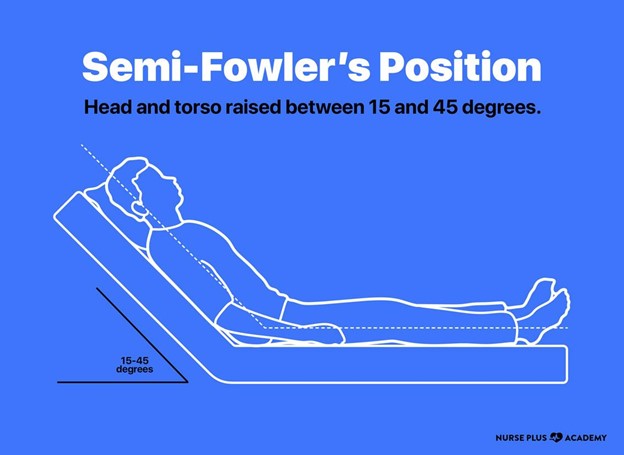A client is transported to the recovery area of the ambulatory care unit after cataract surgery. In which position does the nurse place the client?
Side lying on the affected eye.
Supine
Prone
Semi Fowler's
The Correct Answer is D
Choice A Reason: Side lying on the affected eye is not the correct position for the client after cataract surgery, as it may increase intraocular pressure and cause bleeding or damage to the surgical site.
Choice B Reason: Supine is not the correct position for the client after cataract surgery, as it may cause fluid accumulation and swelling in the eye.
Choice C Reason: Prone is not the correct position for the client after cataract surgery, as it may cause pressure and friction on the eye.
Choice D Reason: Semi Fowler's is the correct position for the client after cataract surgery, as it helps to reduce intraocular pressure and promote drainage and healing of the eye.

Nursing Test Bank
Naxlex Comprehensive Predictor Exams
Related Questions
Correct Answer is D
Explanation
Choice A Reason: Calling the RN supervisor is not the priority action for the nurse, as it may delay the intervention and outcome.
Choice B Reason: Completing an incident report is not the priority action for the nurse, as it does not address the immediate problem or prevent further complications.
Choice C Reason: Checking the blood glucose level is not the priority action for the nurse, as it may confirm the error but not correct it.
Choice D Reason: Giving the client 15 to 20 g of carbohydrate is the priority action for the nurse, as it may prevent or treat hypoglycemia, which is a serious complication of insulin overdose.
Correct Answer is D
Explanation
Choice A Reason: Irrigating the fistula with 3 mL of normal saline solution is not a correct way to assess the patency of the fistula, as it may cause bleeding, infection, or dislodgement of the fistula.
Choice B Reason: Flushing the fistula with 1 mL of heparin solution once per shift is not a correct way to assess the patency of the fistula, as it may cause clotting, infection, or allergic reaction.
Choice C Reason: Infusing 50 mL of normal saline once per 24 hours is not a correct way to assess the patency of the fistula, as it may cause fluid overload, hypertension, or edema.
Choice D Reason: Palpating for a vibrating sensation at the fistula site is a correct way to assess the patency of the fistula, as it indicates that there is adequate blood flow through the fistula. This sensation is also known as a thrill.
Whether you are a student looking to ace your exams or a practicing nurse seeking to enhance your expertise , our nursing education contents will empower you with the confidence and competence to make a difference in the lives of patients and become a respected leader in the healthcare field.
Visit Naxlex, invest in your future and unlock endless possibilities with our unparalleled nursing education contents today
Report Wrong Answer on the Current Question
Do you disagree with the answer? If yes, what is your expected answer? Explain.
Kindly be descriptive with the issue you are facing.
